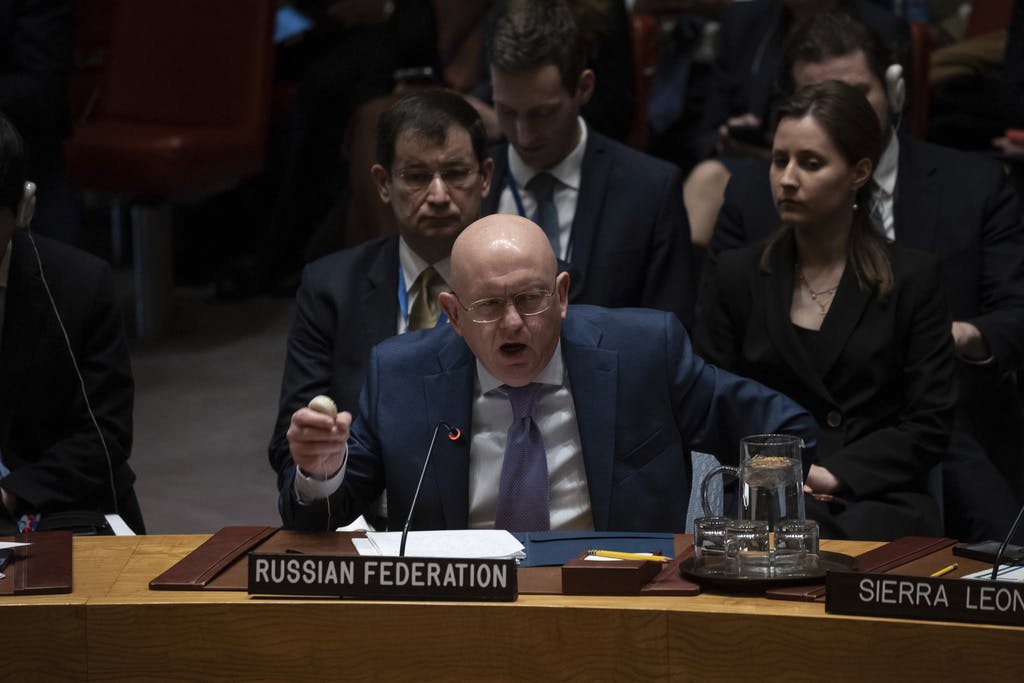Russia and China Veto American Security Council Resolution Calling for Immediate Cease-fire in Gaza
‘This was some kind of an empty rhetorical exercise,’ Russian envoy contends.

UNITED NATIONS — Russia and China on Friday vetoed an American-sponsored United Nations resolution calling for “an immediate and sustained cease-fire” in the Israel-Hamas war in Gaza to protect civilians and enable food and supplies to be delivered to more than 2 million Palestinian Arabs.
The vote in the 15-member Security Council was 11 members in favor and three against, including Algeria, the Arab representative on the council. There was one abstention, from Guyana.
Before the vote, Russian’s UN ambassador, Vassily Nebenzia, said Moscow supports an immediate cease-fire, but he criticized diluted language that referred to moral imperatives, which he called philosophical wording that does not belong in a UN resolution.
He accused Secretary Blinken and the American UN envoy, Linda Thomas-Greenfield, of “deliberately misleading the international community.”
“This was some kind of an empty rhetorical exercise,” Mr. Nebenzia said. “The American product is exceedingly politicized, the sole purpose of which is to help to play to the voters, to throw them a bone in the form of some kind of a mention of a cease-fire in Gaza … and to ensure the impunity of Israel, whose crimes in the draft are not even assessed.”
Ms. Thomas-Greenfield urged the council to adopt the resolution to press for an immediate cease-fire and the release of the hostages, as well as to address Gaza’s humanitarian crisis and support ongoing diplomacy by America, Egypt and Qatar.
After the vote, Ms. Thomas-Greenfield accused Russia and China of voting for “deeply cynical reasons,” saying they could not bring themselves to condemn Hamas’ terrorist attacks in southern Israel on October 7, which the resolution would have done for the first time.
A key issue in the vote was the unusual language related to a cease-fire. It said the Security Council “determines the imperative of an immediate and sustained cease-fire,” — not a straight-forward “demand” or “call.”
The resolution did reflect a shift by America, which has found itself at odds with much of the world as even close allies push for an unconditional end to fighting.
In previous resolutions, America has closely intertwined calls for a cease-fire with demands for the release of Israeli hostages in Gaza. This resolution, through awkward wording that’s open to interpretation, continued to link the two issues, but not as firmly.
While the resolution would have been officially binding under international law, it would not have ended the fighting or led to the release of hostages. It would have added to the pressure on Israel, though, as its closest ally falls more in line with global demands for a cease-fire at a time of rising tensions between the American and Israeli governments.
Meanwhile, the 10 elected members of the Security Council have put their own resolution in a final form to be voted on. It demands an immediate humanitarian cease-fire for the Muslim holy month of Ramadan that began March 10 to be “respected by all parties leading to a permanent sustainable cease-fire.” The Palestinian Arab envoy to the UN, Riyad Mansour, told reporters the vote would take place either late Friday or Saturday morning.
The resolution also demands “the immediate and unconditional release of all hostages” and emphasizes the urgent need to protect civilians and deliver food and supplies throughout the Gaza Strip.
Mr. Nebenzia urged council members to support it, but Ms. Thomas-Greenfield said the text’s current form “fails to support sensitive diplomacy in the region. Worse, it could actually give Hamas an excuse to walk away from the deal on the table.”
The Security Council had already adopted two resolutions on the worsening humanitarian situation in Gaza, but none has called for a cease-fire.
Russia and China vetoed an American-sponsored resolution in late October calling for pauses in the fighting to deliver aid, protection of civilians and a halt to arming Hamas. They said it did not reflect global calls for a cease-fire.
America has vetoed three resolutions demanding a cease-fire, the most recent an Arab-backed measure supported by 13 council members with one abstention on February 20.
A day earlier, America circulated a rival resolution, which went through major changes during negotiations before Friday’s vote.
It initially would have supported a temporary cease-fire linked to the release of all hostages, and the previous draft would have supported international efforts for a cease-fire as part of a hostage deal.
